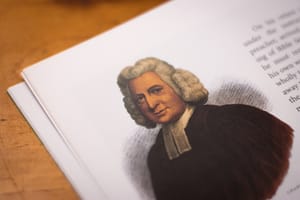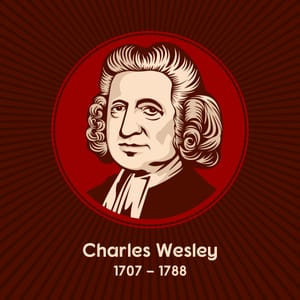Joseph Spoor — aflame for God
Joseph Spoor (1813-1869) was a northern Primitive Methodist minister greatly used in the conversion of thousands of men and women. A full account of his ministry is given in The earnest preacher, by Rev. E. Hall (1879).
By the age of 20, Joseph had already seen a powerful local revival at Appleton Wiske, in North Yorkshire (August ET).
When 22, he was ordained into the Primitive Methodist (PM) ministry at Darlington. By the end of his first three months, there was an increase of 80 members.
Rev. Ralph Shields, one of Spoor’s many sons in the gospel, recounted: ‘Wherever he went, God crowned his labours with marvellous success. Some of the country places, where the good cause had dragged a miserable existence for years, soon presented signs of prosperity and increase.
‘A revival broke out, which spread through the entire circuit. The very name of Joseph Spoor had an effect almost magical. It only needed to be known that he was going to preach the gospel, in order to ensure a large concourse of people’.
Mining village
In a local revival in Southside, County Durham, some extraordinary conversions took place. Centres of gambling were broken up; confirmed gamblers burnt their dice and cards; drunkards were delivered; pugilists and cock-fighters turned from their brutalities. The whole neighbourhood was transformed.
Cockfield, a mining village in a moorland district north of Raby Castle, witnessed some startling scenes. The PM society there was in a low state when Spoor arrived.
He asked directions from the first person he met, who happened to be a PM member. ‘Are you the new preacher?’ inquired the man. ‘Yes’.
‘Come with me to tea, for there will be very few at the meeting tonight’.
‘Will there not?’ Mr Spoor cried out, ‘Glory to God, the place will be full’. Again he shouted, ‘Glory to God!’
Later meeting the same response from another church member, Spoor shouted, ‘I tell you the chapel will be full. Glory be to God!’
Shortly before the service, Spoor put on a black velvet cap which he used at open air services and took out his hymn book.
He set off singing down the street, frequently kneeling to pray (no one joining in with him). As he went, he exhorted the people and announced the forthcoming service.
Presently, coming to a part of the village near a brewery where a number of men were gathered for frivolity, gambling and annoying passers-by, he sang right into their midst. Then, kneeling down, he prayed as they had never heard anyone pray before.
An auction!
When he rose from his knees, he cried out, ‘There’s going to be a grand sale tonight at the chapel. We are going to sell the devil up, and leave him neither stick nor stool; and I am the auctioneer. The sale will commence as soon as I arrive at the chapel. You are all invited, come, every one of you’.
He sang his way on with a crowd following. The meeting place was packed and Spoor prayed and preached like an inspired man. God’s power was seen in the conversion of many, Christ releasing Satan’s captives from bondage in a grand ‘auction’ for their souls.
‘This’, says Ralph Shields, ‘was the turning of the tide of affairs at that village. Afterwards, it only needed to be announced that Mr Spoor was going to be there to ensure a crowded house’.
In May 1836 Spoor was stationed in the Ripon circuit. He had not been there long when the following took place at Colsterdale, a wild and romantic locality five miles from Masham.
The house for preaching in was crowded, it being Spoor’s first visit there. When the sermon was over, as was his custom, he announced a prayer meeting. Just then a strong woman in an angry mood stepped to where he was standing, and gave him a stinging blow on the cheek with her open hand, saying, ‘I’ll let thee know, telling the folk about me!’
She thought Spoor had heard of her character and history and was exposing it anonymously before the congregation.
Opposition
‘My good woman’, said Mr Spoor, ‘I know nothing about you, I never saw you before’. ‘I’se war’ne,’ said the enraged woman. ‘It’s that auld hypocrite’, pointing to the leader, ‘that’s tell’d ye and set ye on to preach aboot me’.
The leader, determining not to have the service ruined, said quietly, ‘I’ll put the devil to the door this time, and then we’ll get on wi’ prayer meeting’.
No sooner said than done. He remarked, as he deposited the woman outside, ‘We’ll be clear o’ the din at ony rate’ (the days of political correctness hadn’t yet arrived!).
The meeting recovered its poise and souls were saved. Spoor used to relate this incident with great glee, saying that this was the second thrashing he had received from a woman, the other being at Cockfield.
An entry in his diary around this time records of one Sunday: ‘I preached at Marton [near Boroughbridge] this morning. A melting time. My soul was all on fire for God’s glory. Had a good time at Staveley in the afternoon.
‘At Marton in the evening, I was strangely held by the powers of darkness. In the midst of repeating the Lord’s Prayer I was stopped, became unable to articulate a word. My head was confused. I stood for several minutes in the pulpit speechless.
‘After awhile the cloud partially broke, and a man cried for mercy. Just upon that, a terrible disturbance took place; a monster of a fellow came and dragged his wife out by very force.
‘We tried, but in vain, to soften his rage. We all felt keenly for the poor woman. Notwithstanding all this we went on with the service; and presently the cloud of God’s glory burst upon us, and a shout of triumph rang through the chapel.
‘These shouts were like claps of thunder. Many that night found the pearl of great price. Blessed be my God!’
Encounter
In September 1837 Joseph Spoor, aged 24, was appointed to Thirsk and Bedale. Within a year 116 members were added to the circuit. During that period, in a place near Boroughbridge, Spoor had the following encounter with an Anglican minister.
One Sunday morning he took his customary stand on the village green to preach the gospel and his voice rang out.
The vicar, hearing the intruder, approached him in a rage, saying, ‘What are you doing here? What do you want, sir?’
Mr Spoor: ‘I am come to do a bit of work to help you, for I see by the state of the place that it needs more than you are doing’.
This increased the vicar’s anger. He shouted: ‘You shall not preach here’.
Mr Spoor: ‘I say respectfully, but decidedly, that I shall’.
The infuriated vicar exclaimed: ‘I’ll stop you’.
Mr Spoor: ‘There are several ways of stopping you, but there’s only one of stopping me’.
Vicar: ‘What do you mean? What do you mean, sir?’
‘Why,’ said Mr Spoor, to the amusement of the bystanders, ‘take away your gown and you dare not preach; take away your book and you cannot preach; and take away your rich income and you won’t preach; while the only way to stop me is by cutting my tongue out’.
Exhaustion
Over the next 30 years, Middleham, Darlington, Newcastle, North Shields, Stockton-on-Tees, Whitehaven and Sunderland were the scenes of Spoor’s abundant and fruitful labours.
In 1861 he was stationed in Durham and remained there seven years. During the first three, nearly 200 were added to the church. Later, another 150 were added.
Towards the end of 1866, his health failed, and for months was confined to his room. His ministerial life of nearly 40 years was drawing to a close. He was exhausted, but his intense and burning desire to save souls never failed.
Spoor’s last Lord’s Day work was at North Ormesby, on 29 August 1869. Shortly before the end, his wife placed a cloth over his eyes to shade them from the sun.
He exclaimed: ‘Take this cloth off my eyes; I don’t want to go into heaven with my eyes shut. I want them wide open to go right away to Jesus!’
His last words were: ‘If anyone asks after me, tell them I am a poor sinner washed in the blood of Jesus!’ Joseph Spoor died on 9 September 1869, aged 53 years.
What God did so wonderfully through Spoor’s ministry, he can do again if he so chooses. For, though we live in very different days, culturally speaking, the sinfulness of the human heart, the relevance and efficacy of the gospel and the power of the reigning Christ to pour out his Spirit, are still exactly the same.
Roger Fay



















